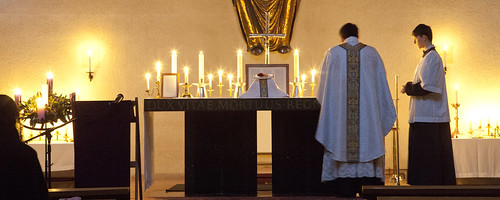 |
| Rorate Mass last Saturday, Holy Rood, Oxford |
You can read the Latin Mass Society's discussion of the Congregation for Divine Worship's Responsa ad dubia, point by point, here.
Many
canonists on the internet and off it have noticed that the Responsa
issued by the CDW seem to be making demands on bishops
and priests which go beyond the authority of a Roman Congregation to make. In
some cases they seem to be taking away prerogatives from bishops which they are
explicitly given by Canon Law, and even by the Second Vatican Council. The Supreme
Legislator, the Holy Father, can of course change Canon Law, but it would be
ludicrous to suggest that the Congregation for Divine Worship can do so. Since
the Holy Father has—presumably, deliberately—given the Responsa only
generic, not ‘specific’, approval, it is the Congregation’s authority which is
at issue.
In the same
way, the Responsa presents itself as an interpretation of Traditionis
Custodes. There has been much discussion online about how exactly, and to
whom, this interpretation is binding. The key point, however, is that an
interpretation of a legal document at best borrows its force from the document
it is interpreting. The Responsa cannot add to the obligations set
out by Traditionis Custodes, and if it attempted to do so, it would fail.
This kind of document falls under the category noted in Canon 33.1:
General executory decrees, even if they are issued in directories or in documents of another name, do not derogate from laws, and their prescripts which are contrary to laws lack all force.
Thus Bishops
retain their authority to make judgements about the justification for binantion
(priests saying extra Masses), under Canon 905.2; they retain their authority
to abrogate the law of the Church for the good of souls, under Canon 87.1; and
they surely retain their authority to judge whether their own priests are
dangerous schismatics. I dare say parish priests retain their authority to publish
what they think appropriate in their parish bulletins, and their bishops retain
the right to overseas this, without having arbitrary judgements, made without
knowledge of local circumstances, imposed on them from a Roman Dicastery.
As JD Flynn
remarks on this subject: “the pope has emphasized frequently that diocesan
bishops don’t answer to curial prefects, and shouldn’t answer to curial
prefects—that the curia was made for bishops, not bishops for the curia.”
In considering
the Responsa, bishops may nevertheless decide that the message they
convey from the CDW is enough, even without legal force, to persuade them to make
life more difficult for Catholics attached to the older liturgy. In making this
judgment, they must at least be mindful of the consideration which presumably
motivated them or their predecessors in allowing celebrations in the first
place: the good of souls, which the Responsa itself regard as the justification
for allowing it.
Some more discussions by canonists and others:
https://chiesaepostconcilio.blogspot.com/2021/12/responsa-ad-dubia-sullapplicazione-del.html (Italian)
Rorate Caeli